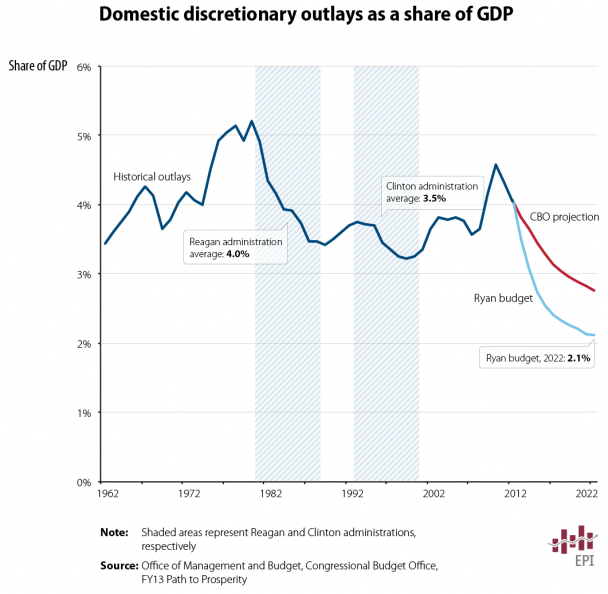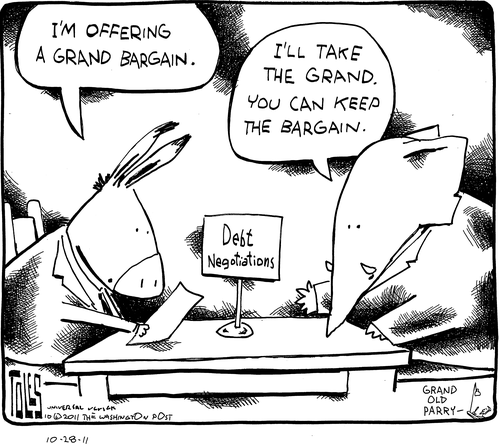Cross posted from The Stars Hollow Gazette
A group of CEO’s from major US corporations have been lobbying Capitol Hill to put cuts to the social safety net at the forefront of negotiations to “fix the debt’ at the same time asking for more tax breaks while they reap the benefits of billions in government contracts and hand themselves lucrative pay raises and pensions while they bankrupt companies and underfund their employee pension funds.
From the Huffington Post
A group of high-profile corporate CEOs are lobbying Capitol Hill this week to put Social Security and Medicare cuts at the forefront of deficit reduction negotiations. Their own retirement funds, however, are secure: The coalition includes 54 CEOs who have amassed combined pension assets of more than $649 million from their companies’ executive retirement plans, according to a new report from the Institute for Policy Studies, titled “A Pension Deficit Disorder: The Massive CEO Retirement Funds and Underfunded Worker Pensions at Firms Pushing Social Security Cuts.”
The CEOs’ employees are much less secure in their retirement than the CEOs. According to the report, less than 60 percent of the 71 public companies offer pension plans for their employees. Of the 41 companies that do, 39 of them haven’t contributed enough to their workers’ pension funds to enable the plans to pay out their anticipated obligations. Among the companies with employee pension funds in the red, these deficits exceed $100 billion.
The CEOs are among 71 chief executives of publicly traded companies who belong to the Fiscal Leadership Council of the influential Campaign to Fix the Debt, a group which has raised more than $60 million to lobby for a debt deal driven by cuts to “entitlements.” The coalition will meet Wednesday morning with congressional leaders, according to sources familiar with the group’s lobbying activities. The group, funded in part by former private equity magnate Peter G. Peterson’s foundation, has pledged to push for austerity during the lame duck congressional session, and beyond. Peterson has spent nearly half a billion dollars in recent years pushing his austerity agenda.
As the debate heats up over whether to cut Medicare, Social Security or Medicaid in order to maintain federal spending and corporate tax breaks, companies with well-compensated CEOs who preside over underfunded employee pension funds invite a new round of questions about the motives, and methods, of the CEOs pressuring Congress and the White House to cut programs for the middle class.
As Talks Begin on “Fiscal Cliff,” Report Warns “Fix the Debt” a Front for More Corporate Bailouts
As the White House begins a series of meetings today on the looming “fiscal cliff,” a coalition of the largest corporate firms and advocacy groups is lobbying for wide-ranging cuts in government spending, including to programs like Medicare and Social Security. The group, which includes 80 of the country’s most powerful CEOs, is called the Campaign to Fix the Debt. It was co-founded by former Clinton White House Chief of Staff Erskine Bowles and former Republican Sen. Alan Simpson, previously the co-chairs of President Obama’s bipartisan National Commission on Fiscal Responsibility and Reform. Critics have accused the group of using the budget crisis to push for corporate tax cuts. We are joined by Sarah Anderson, director of the Global Economy Project at the Institute for Policy Studies and co-author of the new report, “The CEO Campaign to ‘Fix’ the Debt: A Trojan Horse for Massive Corporate Tax Breaks.“
The middle class, elderly, students and the poor have paid more than their “fare share” in this economic downturn while Wall St. and these megacorporations have continued to rake in billions. Social security, medicare and medicaid should be removed from any talks about the “fiscal cliff” myth. Lambert Strether at Corrente enumerated it best.
Not one penny of cuts to Social Security, Medicare, Medicaid, or any other social insurance program, and any savings to be paid out as benefits.
The Democrats are defending programs. But they should be defending households. Here are some of the social insurance programs that are on the table, even if Social Security, Medicare, and Medcaid turn out to be off the table:
Unemployment benefits extension in 2013 ($40 billion): If long-term unemployment benefits are allowed to expire at the end of the year, some 2 million jobless will be affected. Kogan says “there will be some extension, because that’s just brutal. It’s just a question of how much.”
Pell Grants ($36 billion) (pdf): These need-based grants help some 10 million low-income students afford college.
Section 8 Housing Assistance ($19 billion): Section 8 vouchers allow more than 2 million super low-income families to afford decent housing in the private market.
Job Training ($18 billion in 2009): Loads of federal job training programs help millions of seniors, Native Americans, farm workers, veterans, young people, and displaced or laid-off workers with career development.
Head Start ($7.9 billion): The program, which helps kids from disadvantaged homes be better prepared to start school, had about a million enrollees in 2010. Research has shown that Head Start generates real long-term benefits for participants.
Low-Income Home Energy Assistance Program ($3.47 billion): In 2011, about 23 million poor folks got help paying the winter heating bills through LIHEAP.
Community Health Centers ($3.1 billion (pdf): In 2011, more than 20 million patients, 72 percent of whom were below the poverty line, got healthcare through federally-supported community health centers.
Title 1 Education Grants ($322 million) (pdf): Under the No Child Left Behind Act, school districts serving a big percentage of low-income kids get financial assistance to help them meet state academic standards.
Women, Infants, and Children ($7.2 million in 2011): The Department of Agriculture’s WIC program helps low-income moms and babies get access to supplemental nutrition and health care referrals. WIC has about 9 million participants, most of whom are kids.
Not one penny should be cut from of any of these programs. Go scuttle an aircraft carrier or something. Stop one of the wars. Whatever, dude. You’re the Preznit.
Know your president by the friends he keeps.
h/t Suzie Madrak at Crooks and Liars



 The deadline for the bicameral Super Committee to come up with a deal on deficit reduction is a week away. While many
The deadline for the bicameral Super Committee to come up with a deal on deficit reduction is a week away. While many  Scarecrow at
Scarecrow at